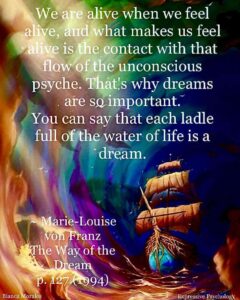“The world is an evolving community in which self-identity is found less in oneself than in one’s ongoing relations to others. The ideal of human interpersonal relations is not individual self-fulfillment in distinction from another but mutual transformation through self-gift to the other and reception of the other as gift.” – Ilia Delio, The Unbearable Wholeness of Being, 193
As I noted in my last post, Jungian analyst Dr. Bud Harris writes, “… while absolute evil may not be able to be integrated, it can, perhaps, awaken us to our better selves and our need to look for the kind of consciousness Dr. Jung thought our future depends on.” Confronting Evil, 86-87
What do these psychologists mean by consciousness? Aren’t we all conscious? What kind of consciousness did Jung think our future depends on?
Freud believed there are two interacting systems in the psyche: ego and unconscious. But Jung’s work with his patients combined with his experiments on himself convinced him that the psyche contains three interacting systems: ego consciousness, personal unconscious, and collective unconscious. In other words, the unconscious has two levels: personal and collective.
- Ego consciousness: This kind of consciousness is simply everything you know, or think you know, about yourself. Your ideas, desires, hopes, preferences, memories, certain emotions you are aware of feeling, attitudes and beliefs you know you carry around with you, things you like and don’t like.
- Personal unconscious: The personal level of your unconscious contains everything you have forgotten or repressed, as well as complexes of attitudes, memories, and thoughts related to a single concept, like mother, or a belief that you are superior or inferior to others. Your ego can access this information if you acknowledge things others tell you about yourself that you don’t want to admit to. Or if you pay attention to your dreams, which show you things you don’t know about yourself every night.
- Collective unconscious: The third level lies ‘beneath’ your personal unconscious. This is the deep level of the soul. Your soul. My soul. Everyone’s soul. It only requires a modicum of familiarity with world mythologies and religions to see that the psyches/souls of every human being always and everywhere are furnished with the same fundamental patterns. Jung called them archetypes. We know they are universal because mythical, artistic, and religions expressions of them appear in every culture throughout history. Even the most physically isolated societies created images and told stories with the same themes, characters, symbols and plots that still resonate with us today.
“Consciousness refers to your individual awareness of your unique thoughts, memories, feelings, sensations, and environments.” verywellmind.com
Nobody is self-aware all the time, and most egos are unaware of both levels of the unconscious most of the time. Our primitive ancestors were conscious of the mysteries of nature and life, of course, but according to Anthropologist Lucien Levy-Bruhl, for the most part they made no distinction between themselves and what they believed they perceived about the world. Levy-Bruhl called this participation mystique, or archaic identity. Migrations into new parts of the world and subsequent relationships with different people, cultures, and belief systems slowly brought more awareness of our individuality to our species.
In our time we are acquiring a shocking realization: we are fundamentally connected to everything else in the world at a deep, unconscious level. Another way of saying this is that each of us is a unique and crucially important part of one unified world soul. But just as you can never see or completely know your own soul, you cannot experience your connection with the world soul through logical, direct means, but only through symbols, ideas, imagination, and synchronicities. This is how the collective unconscious interacts with the other two levels of consciousness. Observing your subtle feeling responses to these prompts, especially those that bring a major “Aha,” raises your self-awareness. Finding meaningful ways to act on them brings you closer to your own soul. This is the kind of consciousness Dr. Jung thought our future depends on.
What does this mean in terms of the future of our world? First, it means that as long as you think of yourself primarily as a tough, self-sufficient individual answerable to nothing but your immediate surroundings and closest, like-minded companions, your conscious energy will focus on maintaining your individual rights and you will trust nothing and nobody but yourself. Alone, ego consciousness is a prescription for mistrust, fear, divisiveness, and war. Do we have a problem with ego consciousness? Consider that the 20th century was the most murderous in recorded history.
Second, it means that if you can’t break through your resistance to your unconscious self — which holds some valuable neglected potential — nothing in your life will change in any lasting beneficial way. The path to your fulfillment is to listen to others and heed the subtle messages you receive from your unconscious, personal and collective. Befriend the other without and within. Otherness is the world soul’s gift to you. Living close to your soul is your gift to the world.
Jean Raffa’s The Bridge to Wholeness and Dream Theatres of the Soul are at Amazon. E-book versions are also at Kobo, Barnes And Noble and Smashwords. Healing the Sacred Divide can be found at Amazon and Larson Publications.com. Her new book, The Soul’s Twins, is available at Schiffer, Red Feather Mind, Body, Spirit and wherever books are sold. Subscribe to her newsletter at www.jeanbenedictraffa.com.






6 Responses
Thanks Jeanie so much, so beautifully articulated. This brings to mind the concept of ‘Ubuntu’ which actually has a long history, though more recently has come to mean ‘I am, because you are’.
Ubuntu is part of the Zulu phrase “Umuntu ngumuntu ngabantu”, which literally means that a person is a person through other people. … Ubuntu is that nebulous concept of common humanity, oneness: humanity, you and me both.n“We are different so that we can know our need of one another, for no one is ultimately self-sufficient,” Desmond Tutu (Former Archbishop of South Africa) wrote in No Future Without Forgiveness (1999). “The completely self-sufficient person would be sub-human.”
Ubuntu has since been used as a reminder for society on how we should be treating others. Nelson Mandela once said: “A traveller through a country would stop at a village and he didn’t have to ask for food or for water. Once he stops, the people give him food, entertain him’.
I’ve copied and pasted from various sources here so thanks to Google. But in my own words, it is through relatedness to others, to our planet, to our consciousness and unconsciousness that we become more aware of the interdependence of all, something I too am more and more realising as a profound truth.
Love to you Jeanie, and thank you again.
Hi Susan,
“A person is a person through other people” I love that! Why doesn’t English have a word like that?
Yes. Without relationship, individuation means nothing. It’s the two together — metaphorically, the feminine and the masculine, the yin and the yang, self and other — that create the sacred third! By the way, your comment made me realize I hadn’t made that clear enough in the last paragraph of my post so I’ve changed it to express that more clearly.
Thank you for the inspiration, and for stopping by.
Much love,
Jeanie
It’s an ongoing challenge to find forms for this message. You do so with constant clarity.
And I like the concept of Ubuntu Susan mentions.
When I feel disconnected, pained by the walls of fear in the world, I often bring to mind the beautiful prayers by Hazrat Inayat Khan.
An invocation always sits ready on my tongue – here in essence –
Towards the One … the Only Being … united with all the illuminated souls … who form the Spirit of Guidance.
Dear Ashen,
“The mystical warrior is trying to reduce the obstruction in the doorway, and the worshipper is attempting to reach the obstruction behind the doorway, almost out of sight. There is a gap between the two … the vague band between the known and the unknown. In that band rapture is possible.” ~Fazal Inayat-Khan
Thank you for the invocation. It brings comfort and peace.
So happy you got ‘Heart of a Sufi.’ Nothing is certain these days. Huge thanks for your lovely review of CoM, got it, and saw it on amazon.com. If you approve I’ll use it in my next post. Will respond to your email soon. Had a stressful day with the Department of Work and Pension. ♥
I’m glad you liked the review of Course of Mirrors. Of course. Use it way you like. 🙂